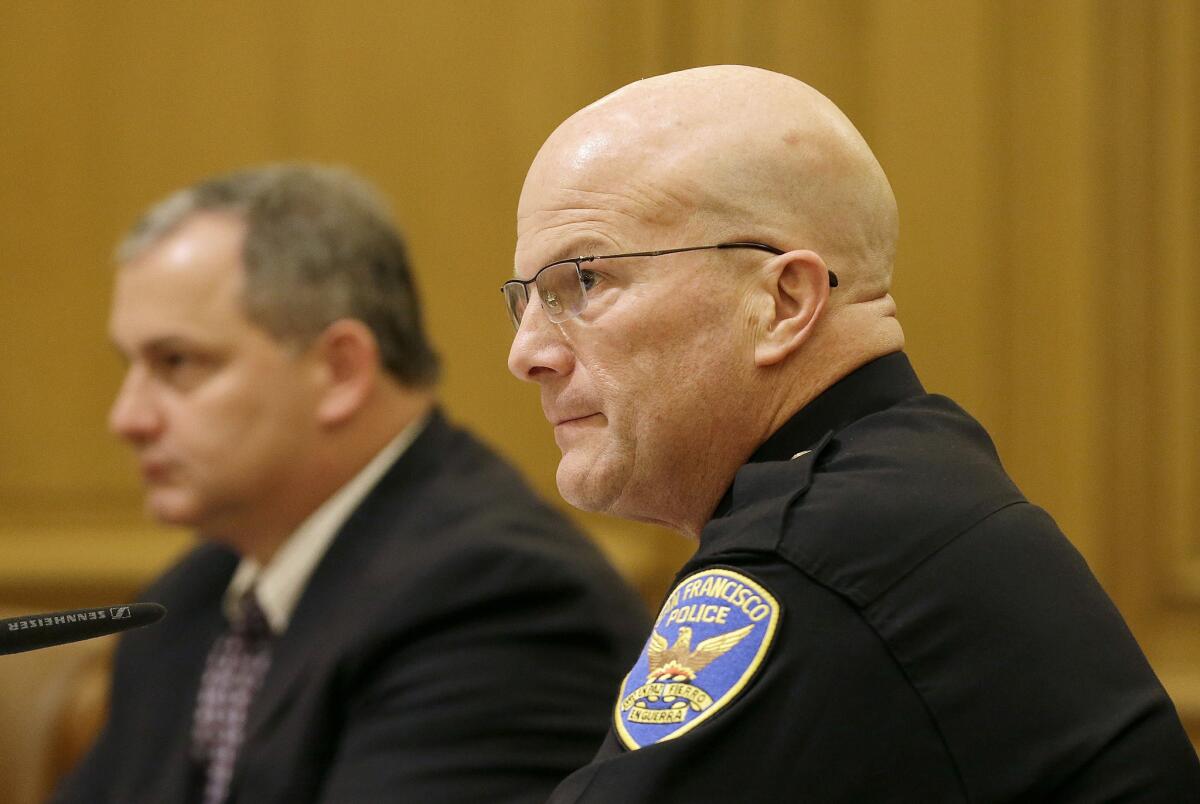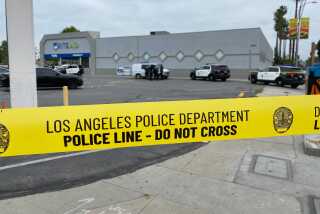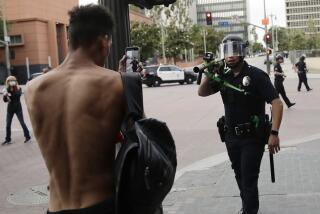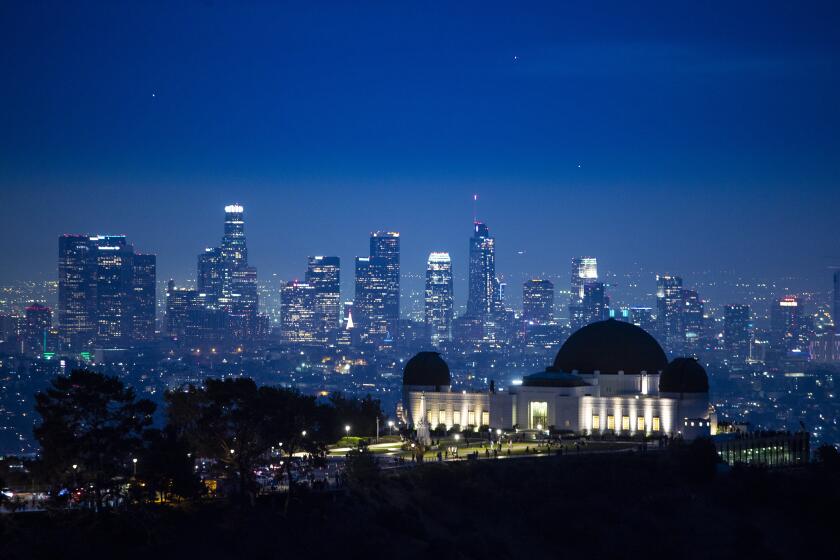San Francisco is one of just 2 large U.S. cities without police stun guns -- but that may change

San Francisco Police Chief Greg Suhr, right, listens to public speakers during a meeting of San Francisco’s Police Commission in San Francisco on Wednesday, Dec. 9, 2015.
- Share via
Reporting from San Francisco — San Francisco is one of only two large cities in the country that do not equip officers with stun guns, a situation the city’s police chief wants to change after police fatally shot a knife-wielding stabbing suspect last week.
Police Chief Greg Suhr publicly renewed a call Wednesday night to add the weapon to his department’s arsenal, exactly one week after five officers shot and killed 26-year-old Mario Woods in the city’s Bayview neighborhood. The shooting was captured on video and circulated widely online, fueling community protests and calls for the chief’s resignation.
NEWSLETTER: Get essential California headlines delivered daily >>
The police chief said the fatal shooting could have been avoided if the responding officers had been equipped with Taser stun guns, which deliver 50,000 electrical volts and are designed to temporarily incapacitate suspects without killing them.
Critics say the weapon sometimes kills suspects in poor health and officers can mistake it for a gun, with fatal consequences. Civil rights groups and community activists say that, instead of more equipment, police need additional training in crisis intervention and how to defuse confrontations between police and armed suspects who sometimes are mentally disturbed or under the influence of drugs or alcohol.
Suhr and three of his predecessors previously failed to win the police commission authorization for stun guns even as the vast majority of the nation’s law enforcement agencies have been outfitting officers with the weapon, which is shaped like a handgun and often is holstered on the officer’s gun belt. Previous police commissions rejected use of the Taser, saying they were concerned the weapon could kill and maim suspects, especially those with heart conditions.
Some law enforcement experts say Tasers cannot prevent all use of deadly force by police but are useful in some circumstances.
“It’s a good tool,” said Jay Wachtel, a criminologist at California State University, Fullerton. “The problem is that they don’t practice enough with them.”
Wachtel said stun guns are designed for the situation— a man with a knife surrounded in close quarters by police officer — that led to the fatal shooting of Woods.
In the Dec. 2 shooting, Suhr said the Taser probably would have been an effective tool in disarming Woods without gun fire.
Police encountered Woods less than an hour later on a street carrying a knife. Police said Woods ignored demands to drop the knife he was carrying, even after he was pepper sprayed and shot with bean bags full of lead pellets.
Suhr said police with guns drawn opened fire when it appeared Woods was raising the knife and approaching one of the officers.
The five officers who fired their guns have been placed on administrative leave pending the outcome of three investigations into the shooting, which was captured by video by at least two witnesses.
Suhr appeared at a police commission meeting Wednesday and publicly renewed his call for police officers to be equipped with Tasers and said that a group is reviewing the department’s use-of-force policies and should have a draft ready by January. The seven member board, which is appointed by the mayor and the city’s board of supervisors, disciplines officers and sets policy.
Commissioner Petra DeJesus said stun guns often “open up a lot more problems than they solve,” when officers misuse the weapon. DeJesus called for a review and revision of the police department’s use-of-force policies and procedures.
Hundreds of people outside the City Hall meeting demanded Suhr’s resignation and lit candles in Woods’ memory.
Woods’ cousin, Jeff Stewart, echoed the protesters’ calls for Suhr to resign and said the family also wants the five officers who fired their guns to be charged.
“He was a person. He deserves to be breathing,” Stewart shouted during the hours-long, emotional meeting that was at times interrupted by chants of “Fire Chief Suhr! Fire Chief Suhr!”
The family is asking that the police department pay for Woods’ funeral and that federal authorities investigate the case, Stewart said.
He said his family also wants Suhr to personally apologize to Woods’ mother.
Suhr said he has spoken to Woods’ mother and apologized for her son’s death.
“Why did they shoot?” asked Shawn Richard, head of the nonprofit Brother Against Guns. “There were a whole a range of things they could have done to defuse the situation before shooting.”
Richard said he supports outfitting police with Tasers.
But others do not want police in San Francisco to have stun guns.
Local NAACP President Rev. Amos Brown called Suhr’s plan to equip officers with Tasers and other gear such as plastic shields “too simplistic.” Brown said at an NAACP-organized meeting this week that the department has failed to implement diversity recruiting, sensitivity training and other suggestions made by the group.
You don’t need a shield, you need sense. Not just Tasers, you need trust. And this community does not trust the police.
— Local NAACP President Rev. Amos Brown
“You don’t need a shield, you need sense,” Brown said. “Not just Tasers, you need trust. And this community does not trust the police.”
Taser spokesman Steve Tuttle said San Francisco and Detroit are the only two cities with populations of more than 500,000 that do not use stun guns. Detroit police were barred from using stun guns after community activists opposed their use on safety grounds.
“It’s by no means a magic bullet,” Tuttle said. “But it’s a useful tool for police.”
Nearly all police departments purchase stun guns from Taser, which is based in Scottsdale, Arizona. Taser has sold 2.9 million Tasers since 1993, and 17,800 law agencies have them.
Some smaller departments don’t have the budget to acquire the weapons, which can cost about $1,000.
There also have been cases where officers said they confused their handgun with their Taser and ended up fatally shooting a suspect.
Northern California transit police officer Johannes Mehserle was convicted of involuntary manslaughter after he shot to death passenger Oscar Grant on Jan. 1, 2009. Mehserle said he fired his service weapon when he meant to stun Grant with his Taser.
In San Francisco, Suhr said officers had no other weapons at their disposal except their handguns after pepper spray and bean bags failed to stop and disarm Woods. Suhr said it appears officers fired their guns after Woods refused commands to drop a knife and appeared to raise the hand holding it.
Community members and neighbors who have viewed the video argue that Woods appeared to be hurt and not a threat and have voiced their frustrations. The city’s public defender also said it appeared that the shooting was not necessary.
Suhr noted that London police were able to stop a knife attack this past week in that city’s subway by shooting the suspect with a stun gun.
“If that exact same incident happened here in San Francisco,” Suhr said, “we would have nothing but lethal force. So we would like to have Tasers.”
ALSO
A deal to remove four Klamath River dams is in danger of collapse
Highland Park nonprofit takes the homelessness problem into its own hands
Wettest start to an El Niño season in Pacific Northwest as storms hit California
More to Read
Sign up for Essential California
The most important California stories and recommendations in your inbox every morning.
You may occasionally receive promotional content from the Los Angeles Times.










